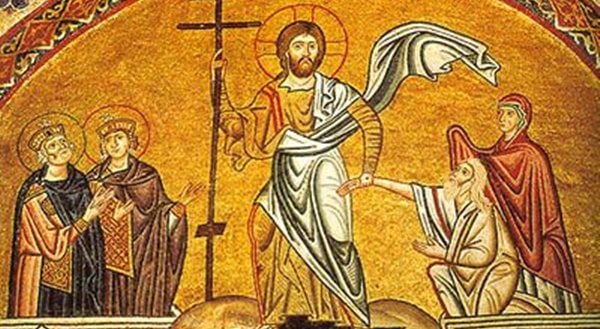There’s an ancient Christian tradition that claims the first Sunday after Easter is Holy Humor Sunday.
The tradition goes back to the ancient church of the 4th century. They claimed that the whole weekend of Good Friday through Easter Sunday was kind of like a big divine joke.
A good joke sets up our common expectations for how the world is and then flips it on its head. So, in that spirit, on Holy Humor Sundays pastors tell jokes. I can’t resist, so I’m going to tell you a few jokes. But before I do, I need to do me a favor and laugh hysterically after the joke. This is for two reasons. First, science tells us that laughter is good for your body. So that’s the first reason you need to laugh. It’s good for your body and your soul. The second reason is that these are really cheesy jokes that might make your groan, but the more you laugh, the more it will make me feel better about myself.
A priest, a rabbi, and a UCC pastor went fishing. They were out in the lake on a boat when the priest had to go to the bathroom. So he said a prayer, stepped out of the boat, and walked across the lake to the solid ground. When he came back to the boat, the Rabbi decided he also need to go. So he said a prayer, walked out of the boat and across the lake. When he came back, the UCC pastor had to go. So he said a prayer, stepped out of the boat and sunk straight into the water. The priest said to the rabbi, “You didn’t tell him about the rocks?”
After worship one Sunday, a young boy told the pastor, “When I grow up, I’m going to give you some of my money.” “Thank you,” the pastor replied. “But why?” The boy responded, “Because my daddy says you are one of the poorest preachers we’ve ever had.”
Okay, last one. And this is a good one. One Sunday the pastor announced there would be a Church Board Meeting after the service. When the service ended, the board met in the back of the sanctuary. But a visitor who was there for the first time was at the meeting. The pastor said, “We are glad you are interested, but this is for the church board.” The visitor said, “Yes, I know. And after today’s sermon, I suppose I’m just about as bored as anyone else who came to this meeting.”
Okay. So we got the cheesy jokes out of the way. But there’s still a question that we need to explore about Holy Humor Sunday: “What did God do that was so humorous?”
But the spiritual leaders of the early church spoke of God less as a jokester and more as a trickster. You might say God is a practical jokester. Like when my eldest son (BRAYDEN) started watching YouTube videos several years ago and found the practical joke channel. One video showed a man putting saran wrap over his family’s toilet bowl. Yes, my oldest son tried that practical joke, but fortunately he couldn’t stop laughing when he was in the bathroom so I knew he was up to something no good!
For the early Church, God’s practical joke was a little different from a 6 year old’s practical joke. They said that God’s practical joke had to do with Christ’s work on the cross and also the resurrection.
The Bible claims that on the cross, Jesus defeated the powers of evil and death. But the Bible doesn’t have a theory for how Jesus did that. So, fairly quickly in church history, theologians began to come up with theories of the Atonement.
Atonement is a strange word, but breaking it down into its parts helps us understand it better. Atonement essentially means “at-one-meant.” We are meant to be at one with God and one another. In some mysterious way, the cross and resurrection achieved this at-one-meant for humanity.
But if you are like me, when you think of atonement, you probably don’t think of a humorous or playful practical joke. For many of us in the progressive church, the word “atonement” is like a four letter word. That’s because the dominant understanding of atonement in the United States is Penal Substitutionary Atonement and it often goes like this: Humans sinned in the Garden of Eden. Ever since that original sin, God looked upon humanity with infinite wrath, because God is infinitely holy and just and sin defiles God. So, God is infinitely wrathful and needed an outlet to channel His (and it’s always His in this theory) wrath upon. Jesus, the Son of God, says, “Okay Father, I’ll take your wrath upon myself.” And so Jesus comes to save us from God.
In Penal Substitutionary Atonement theory, Jesus came to save us from God. Some people claim that this theory is the Gospel. That Jesus came to save us from the wrath of God is the Good News, and if you take it away, you take away the essence of Christianity.
When I was growing up and I heard this theory, something inside of me recoiled. I protested inside. I was always taught that if God was infinite anything it was infinite love. How, if God was infinite love, did Jesus have to save us from a God of infinite wrath?
It didn’t make sense logically. And you know what? It wouldn’t have made sense to the early church, either. That’s because Penal Substitutionary Atonement theory didn’t get formed until the 16th century with a man named John Calvin and his followers. In fact, when I talk with my Catholic friends about this idea of the wrath in God, they look with horror and call it a heresy. That’s because it is a heresy. Penal Substitutionary Atonement is the most egregious Protestant heresy there is.
But here’s the Good News. The early Christians didn’t talk about Atonement this way. They never would have said that Jesus went to the cross to save us from God’s wrath. Rather, they said that Jesus went to the cross to play a big, cosmic practical joke that defeated the Devil and Death itself.
Notice that for the early church, our biggest enemy was not God, but the Devil and Death. God was not against humanity, but for our freedom from the powers of evil, including the powers of fear, the Devil, and Death. And so at his death and in his resurrection Jesus was victorious over the power of evil. This theory is often called Christus Victor.
To describe how Jesus was victorious, the early church came up with a metaphor that seemed like a practical joke God played on the Devil and Death. They said it was like God went fishing and Jesus was the bait. Death and the Devil were ravenous fish who eventually swallow everyone into its belly.
But, this theory says, God tricked Death and the Devil by becoming fully human. The divinity of Jesus was hidden within his flesh and bones. And so when the powers of evil swallowed up Jesus into death, the divinity within Jesus burst forth, conquering the fish.
As with all metaphors, this one breaks down at certain points. But personally, I love it because of its playfulness. I love it precisely because of its near absurdity. I love it because like a good joke, it flips my natural inclinations upside down.
When I was growing up, if someone were to say to me, “Explain how Christ was victorious over the powers of evil,” I would have said it would have been like Jesus brought His divine army and went to war and was victorious. My Jesus would have had some cosmic battle where it went back and forth. Maybe it looked really bad for Jesus, but in the end he would have won.
I think this is the default position of most people. To be victorious means defeating our enemies in some kind of a battle. But that wasn’t the case for the early church. They described it as fishing!
When I think about it that way, it’s kind of silly. There’s a kind of absurdity to it. And the joke continues in the resurrection, when the joke isn’t on Death and the Devil, but the joke is on us.
In our story today from the Gospel of John, the disciples are living in fear because Jesus, their leader, has just been killed. They lock themselves in a room because they are afraid the people who killed Jesus might come after them, too. And then, all of a sudden, the person they just abandoned and betrayed showed up in front of them. Jesus shows up and says to them, “Peace be with you.” He says it to them three times. Why did he have to say it three times?
Because they just betrayed and abandoned this man. Jesus had to assert over and over again that even though they deserted him, he was not out to get them. He was not a ghost or a zombie out for violence or revenge. He was there to offer them peace.
Do you sense the playfulness in all of this? This is what Holy Humor is all about. God defeats evil not with violence, which would just add more evil into the world. Rather, God defeats evil by going fishing. Jesus resurrects not enact divine revenge on the people who deserved it, but to offer peace. That’s how God creates Atonement.
But still, you and I know that evil and death are all around us today. Despite the claim that Jesus had defeated evil and death, the early Christians knew that evil and death were all around them, too. In fact, they were often persecuted. And I’m not talking about “You need to bake a cake for your lgbtq neighbors.” That’s not persecution. The early Christians were often killed for their faith.
But they knew that because Jesus defeated the powers of evil and death that evil and death didn’t have the last word. And so they stared evil in the face. They trusted that there was a power bigger than death. And that power was resurrection. That power was God’s love. And that power allowed them to live with a certain lightness and sense of humor.
So, what does this mean for us today? I think it means that we can take our fight for justice seriously, but we don’t need to take ourselves too seriously. I think it means that we can work for justice with a sense of humor. Yes, the powers of evil and death are all around us. We know those powers are still here when certain people claim there’s a caravan of Latin Americans coming to take over the United States. And then certain people make the claim that those Latin Americans are rapists and trying to enter the United States illegally.
Did you hear that claim being made this week? I was infuriated at the continual scapegoating of our Latin American siblings. But then I found some humor in the story. The claims were so ridiculous that a Breitbart reporter who covers border immigration stated that those claims were false. That in fact, those from Latin America “coming to a port of entry and requesting refugee status. That is legal.”
No doubt, we need to continue our work for social justice, and I think it’s important to hold a sense of humor as we do that work. A Breitbart reporter correcting a negative story on immigrants is a bit unexpected for me. There’s a certain holy humor in that. It softens my heart as it flips my expectations upside down.
And that’s why I love this ancient Atonement theory of Christus Victor. God flips my expectations upside down by defeating evil, not with bigger and more violent forms of evil, but by going fishing. Silly, isn’t it?
But for me, the story of God fishing and the story of the Breitbart reporter helps me to find hope in unexpected places. In places of humor and creative nonviolence. For God has already defeated evil and death, and God did it in the most unexpected way. But going through death on a cross and resurrecting to offer peace. Or, as the early Christians put it, God went fishing.
And so as we continue our work for a more just world, may we do some fishing.
May we find humor in unexpected places.
And may we relax, knowing that Christ has been victorious over the forces of evil and death, making us one with God and one another. Amen
Image: Copyright: jahmaica / 123RF Stock Photo
Stay in the loop! Like Teaching Nonviolent Atonement on Facebook!
















